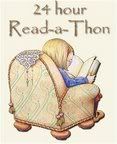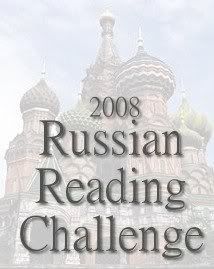 I completed Carl's RIP II Challenge last week and I'm already strategizing as to what I'll read during Challenge the Third next fall. . . maybe then I'll finally finish The Italian, one I started last fall but abandoned when I realized I wouldn't have time to complete it by the deadline and somehow managed to never get around to picking it up at all this fall, and I could read. . .
I completed Carl's RIP II Challenge last week and I'm already strategizing as to what I'll read during Challenge the Third next fall. . . maybe then I'll finally finish The Italian, one I started last fall but abandoned when I realized I wouldn't have time to complete it by the deadline and somehow managed to never get around to picking it up at all this fall, and I could read. . .But what did I actually manage to read for the challenge this year?
First I read Stephenie Meyer's Twilight, a totally absorbing young adult vampire novel that everyone else has already read, so I'll just say this: if I could have put my hands on a library copy of the sequel immediately after finishing this one, I would have. But since one wasn't available, I did some thinking about how I expected the series to end. And what I concluded was that Meyer hadn't presented any real reason why Bella ought not become a vampire--obviously Edward and his family could help her control her urges to kill humans, she could be with Edward forever, her parents would just have to deal with having a vampire for a daughter--and I knew I wouldn't be happy with a lot of angst that merely put off such an ending. But if Bella were to grow up and to realize why becoming a vampire wasn't such a spiffy thing to do, despite her love for Edward, then it would be worth it to continue with the series, especially since there were going to be werewolves involved. So when the third book in the series showed up on the new book cart I skimmed the ending. Rest assured that young adults and true romantics will be happy with how things turn out for Bella and Edward, but Bella is no Buffy and Meyer is no Joss Whedon and, as my husband keeps reminding me, I don't like vampires anyway.
My second read for the challenge was a Joseph Conrad novella, The Shadow-Line, which I became interested in reading after enjoying Lord Jim back in the summer. This one wasn't near as good as Lord Jim (or Heart of Darkness), and I still don't understand how a third mate who impulsively resigned from his post on a ship to give up the sailing life forever could find himself made captain of a another ship just a few short days later. It's an initiation story gone horribly awry, with supernatural elements stemming from the fever dreams of the chief mate, who believes the evil former captain is haunting the ship.
I loved Henry James's The Turn of the Screw. While I know many (most?) read it as a ghost story, in my mind it's totally a psychological tale of a young governess who descends into psychosis. And I enjoyed Diane Setterfield's very bookish The Thirteenth Tale, taking issue only with the modern portion of the tale: I can't imagine why Margaret's mother wasn't in therapy and on antidepressants. (I love the line from James Hynes's The Lecturer's Tale: As a paper topic over the weekend, he asked all three classes to consider whether literature could be cured by antidepressants.) Some aspects of gothic lit just won't work in the modern; I really appreciated when the doctor prescribed a different genre of literature to the ailing Margaret.















